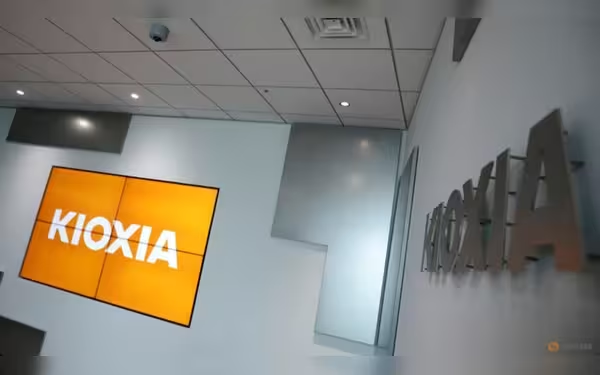Friday, October 18, 2024 05:19 AM
Bain Capital's Kioxia IPO Plans Stalled Amid Valuation Discrepancies
- Bain Capital sought $10 billion valuation for Kioxia.
- Investors propose only $4 billion valuation.
- Kioxia faces challenges in the memory chip market.
 Image Credits: channelnewsasia
Image Credits: channelnewsasiaBain Capital's plans for Kioxia's IPO falter as investors propose a significantly lower valuation amid market challenges.
TOKYO: Bain Capital, a prominent U.S. buyout firm, has faced significant challenges in its attempt to list Japan's Kioxia, a leading memory chipmaker, on the stock market. Initially, Bain sought a lofty valuation of $10 billion for Kioxia, but investors have expressed reluctance, proposing a valuation of only around $4 billion. This stark difference in expectations has led Bain to abandon its plans for an initial public offering (IPO) that was scheduled for October.
Kioxia, which was previously known as Toshiba Memory, was acquired by Bain and its partners in 2018 for approximately 2 trillion yen, equivalent to $13.4 billion. The company has been navigating a tumultuous landscape, including its separation from the troubled Toshiba and stalled merger talks with Western Digital due to pushback from investor SK Hynix. The memory chip market has been under pressure, with declining demand for smartphones and personal computers, further complicating Kioxia's situation.
According to sources, investors are currently valuing Kioxia at about 800 billion yen, significantly lower than Bain's target of 1.5 trillion yen. This valuation gap highlights the investors' concerns regarding the memory chip market's stability. A fund manager from an Asian hedge fund noted, "An IPO this year looks difficult given NAND market conditions, although it may be possible by the end of the financial year." This statement reflects the cautious sentiment surrounding Kioxia's potential market debut.
Despite some improvement in NAND prices this year, driven by the rise of artificial intelligence, the overall demand remains lackluster. Akira Minamikawa, a senior analyst at Omdia, pointed out that while prices have seen some recovery, they have plateaued. The anticipated growth in AI applications is expected to boost demand for memory chips in the coming years, but for now, Kioxia faces stiff competition from both South Korean and U.S. rivals.
As the Japanese stock market experiences volatility due to recent economic changes, including a surprise interest rate hike and a new Prime Minister, Kioxia's IPO attempt is being closely monitored. This situation serves as a critical test for buyout firms in Japan, where many companies are either selling off non-core assets or opting for private ownership.
Damian Thong, head of Japan research at Macquarie Capital Securities, remarked, "Private equity usually does not buy semiconductor companies, because capital needs are high, and finessing the timing of exit is hard given the industry cycle." This insight underscores the complexities involved in the semiconductor industry, where financial demands and market timing are crucial.
In a bid to revitalize its semiconductor sector, the Japanese government has pledged substantial subsidies, amounting to 242.9 billion yen, to Kioxia and Western Digital to enhance production capabilities. Kioxia's strategic importance as a memory chip supplier for AI applications cannot be overstated, making its future prospects a matter of national interest.
While Kioxia's IPO plans have hit a snag, the evolving landscape of the memory chip market and the government's support may pave the way for a more favorable environment in the future. Investors and industry watchers alike will be keenly observing how Kioxia navigates these challenges and whether it can ultimately achieve a successful market debut.













